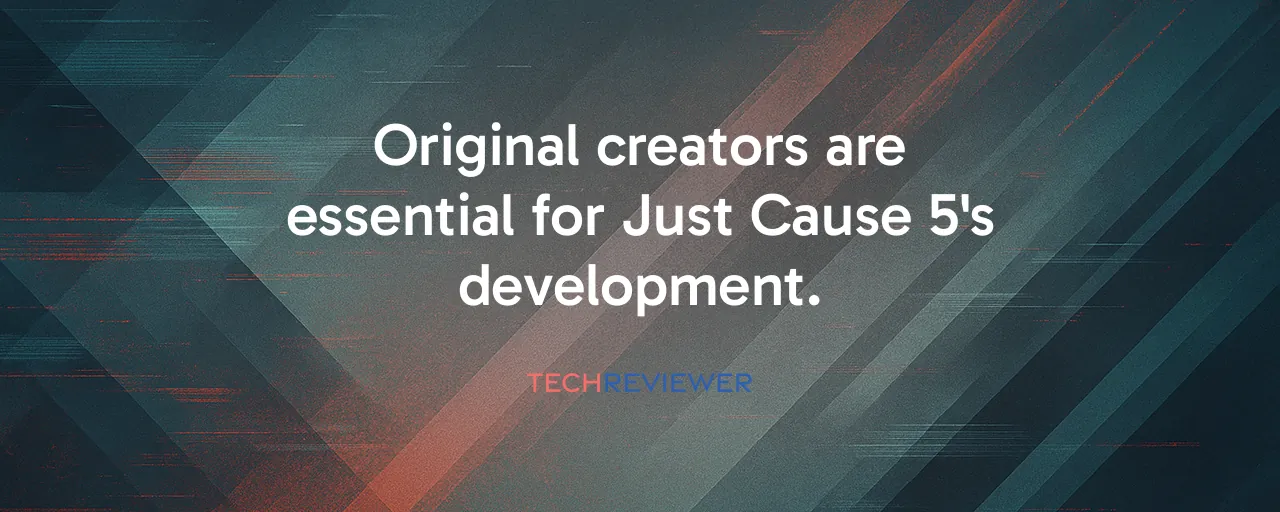Founder Declares Just Cause 5 Impossible
Christofer Sundberg, who started Avalanche Studios back in 2003, made it clear in a November 2025 social media post that Just Cause 5 has no chance of happening under the studio's current setup. He pointed out that almost none of the original team remains on board. This statement came after leaked details about the project's two-year run at Sumo Digital from 2021 to 2023 surfaced earlier in the year.
Sundberg took partial responsibility for the troubles with Just Cause 4 in 2018. He explained how he got pulled into management duties and away from hands-on creative work, which hurt the game's direction. Publisher issues and team structure problems added to the mix. Even so, he still sees untapped potential in that entry's open-world design and mechanics.
Team Turnover Blocks Franchise Path
The core issue boils down to people. Sundberg stressed that rebuilding the series demands the folks who built its signature destruction physics and massive playgrounds from the ground up. With most of them gone, any new attempt would start from scratch in a crowded market.
Avalanche's acquisition by Nordisk Film in 2018 marked a turning point. The studio moved from an independent outfit focused on bold ideas to a subsidiary handling tighter budgets and corporate goals. This change followed the cancellation of Contraband, another open-world project announced in 2021 and scrapped in August 2025, leading to the closure of the Liverpool studio and more layoffs.
Sales Numbers Tell a Tough Story
Player interest peaked with Just Cause 2, which racked up 4.1 million copies sold and 26.1 million hours played in its first six months after launch. Just Cause 3 held strong with 2 million units on PlayStation 4 alone. Then Just Cause 4 opened to just 378,056 units in its first week, less than half of its predecessor's 864,000.
These figures show why publishers hesitate. Open-world games now demand budgets over $100 million and teams of 100 to 200 people working for five years or more. A single weak performer can trigger cutbacks across the board.
Resident Evil 2 Remake Shows Revival Works
Capcom brought Resident Evil 2 back in 2019 with a full remake that kept the horror core but updated controls and visuals for modern hardware. The result: massive sales and critical praise. They retained key survival mechanics while fixing clunky elements from the 1998 original, proving that fresh tech paired with familiar hooks draws crowds.
This approach succeeded because Capcom maintained a stable core team familiar with the series DNA. They avoided spreading resources thin and focused on polish over expansion.
Red Faction Fade Offers a Warning
Volition's Red Faction series started strong with destructible environments in 2001, much like Just Cause. After Guerilla in 2009 sold well, Armageddon in 2011 shifted to linear levels and lost momentum. No main entry has appeared since, despite the studio's later work on Saints Row.
The key lesson here involves sticking to what sets a series apart. Red Faction drifted from its geo-mod destruction tech, and player interest followed suit. Publishers saw no clear path to profits without a big reinvestment in that unique selling point.
Creative Sparks Versus Corporate Realities
Sundberg founded Avalanche to push boundaries and take chances on ideas others dismissed. He wants the studio to recapture that spirit: experiment freely and build impossible worlds. Current leadership prioritizes efficiency and predictable returns, which clashes with the risks needed for standout open-world titles.
Some developers argue for hybrid models where creative leads guide vision while business experts handle operations. Others point to independents like Sundberg's new Liquid Swords studio as places where original ideas might flourish without heavy oversight. Balancing both sides remains the ongoing challenge for any team eyeing a Just Cause return.
Paths Forward Demand Bold Choices
Reviving Just Cause could involve bringing back veterans like Sundberg in advisory roles or partnering with studios experienced in physics-driven worlds. Licensing the Apex Engine to others might fund experiments without full commitment.
Player feedback loops and smaller-scale tests could gauge interest before a huge budget. Whatever the route, success hinges on recapturing the chaos and freedom that defined the early games, all while navigating the high stakes of today's development landscape.
